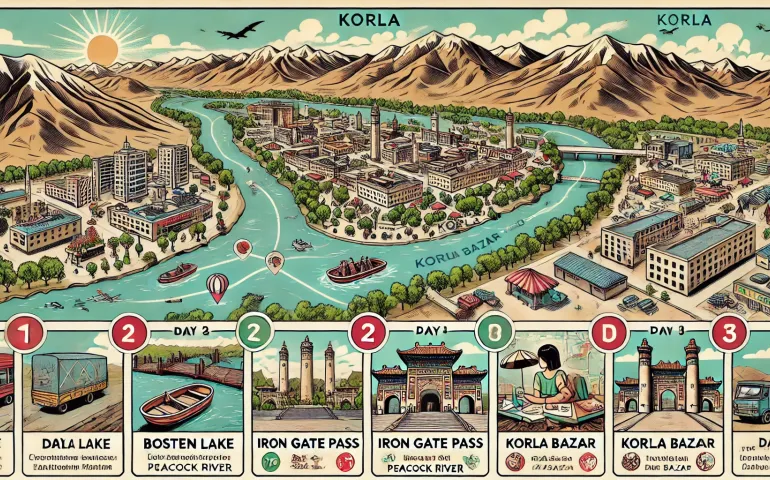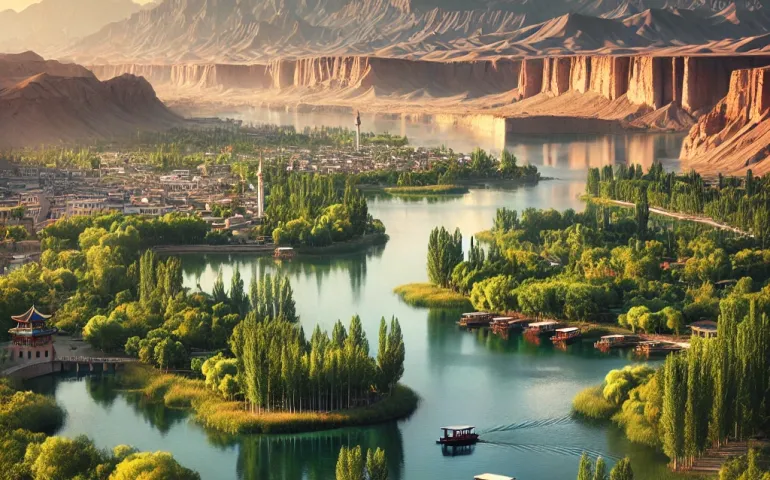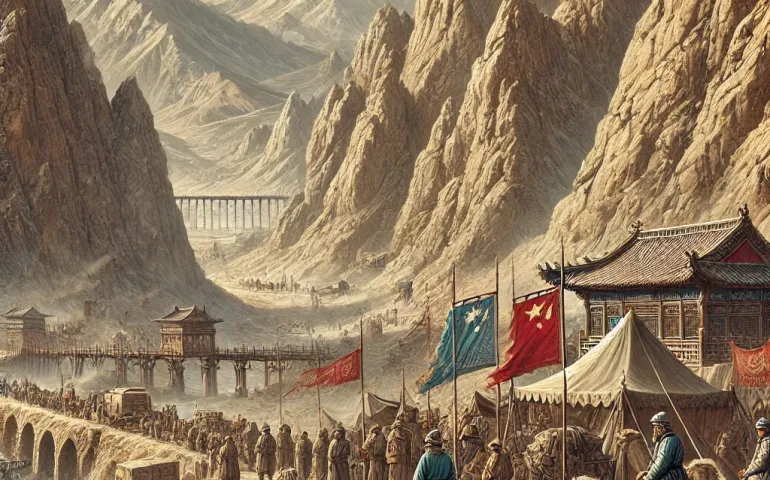About Place
- Korla, "Pearl of the Silk Road" : Offbeat destination in the Xinjiang Uyghur Autonomous Region, China.
- Lush Greenery Amidst Desert : Known for its greenery in contrast to the surrounding desert landscape.
- Blend of Ancient Culture and Modern Development : Fascinating mix of history and contemporary life.
- City of Contrasts : Described by travelers as a place where serene Bosten Lake meets the rugged Tianshan Mountains.
- Breathtaking Landscapes : Offers stunning views and a peaceful retreat, away from typical tourist routes.
Reasons to Visit
- Natural Beauty and Scenic Spots : Korla's natural allure is undeniable. The city is home to the largest inland freshwater lake in China, Bosten Lake, which offers stunning views and opportunities for boating and fishing. Additionally, the Iron Gate Pass, a historically significant site, provides a picturesque backdrop with its dramatic cliffs and the shimmering Peacock River winding through the city.
- Cultural Fusion and History : Korla is a cultural melting pot, with influences from Uyghur, Han, and other ethnic communities. This fusion is evident in the city's architecture, cuisine, and local traditions. Korla's history as a key stop on the ancient Silk Road adds a layer of mystique, making it a fascinating destination for history enthusiasts.
- Unique Local Experiences : From tasting the world-renowned Korla fragrant pears to exploring the city's vibrant bazaars, Korla offers unique experiences that are deeply rooted in its local culture. The city's traditional Uyghur music and dance performances are a must-see, providing insight into the rich cultural tapestry of the region.
Visa
- United States, Canada, Australia, and most European countries : A tourist visa (L visa) is required, typically valid for 30 to 60 days. The application process usually involves submitting an application form, passport photos, and an invitation letter or itinerary.
- Southeast Asian countries (e.g., Singapore, Malaysia) : Some citizens may be eligible for visa-free entry for short stays of up to 15 or 30 days.
- South Asian countries (e.g., India, Pakistan) : A tourist visa is required. The application process may require additional documentation, such as a letter of introduction.
- Russia and Central Asian countries : A tourist visa is typically required, with varying validity periods depending on the agreement between the country and China.
Travel Expenses
1. Travel to & from Destination :
- Airfare : Approx. $500-$800 per person round trip from major metro cities (e.g., Beijing, Shanghai) to Korla.
2. Hotel Cost :
- Average Cost per Night : $50-$100 for mid-range hotels.
- Total Cost for 2 people for 2 nights : $200-$400.
3. Food Cost :
- Average Cost per Meal : $10-$20 per person.
- Total Food Cost for 2 people for 6 meals : $120-$240.
4. Activity Cost :
- Bosten Lake Visit : $30 per person for boat rides and entrance fees.
- Iron Gate Pass : $20 per person.
- Cultural Performance : $15 per person.
- Total Activity Cost for 2 people : $130.
5. Near Destination Travel Cost :
- Car Rental : Approx. $50 per day.
- Total for 3 days : $150.
Total Estimated Travel Cost : $1,100 - $1,400

Best Itinerary
Day 1 : Arrival and Exploration of Korla Arrive in Korla, where you'll be greeted by the city's mix of modernity and tradition. Check into your hotel and take some time to relax. In the afternoon, visit the bustling Korla Bazaar, where you can shop for local handicrafts, spices, and the famous Korla pears. For lunch, enjoy traditional Uyghur cuisine at Alim’s Restaurant, sampling dishes like polo (pilaf) and kebabs. In the evening, take a leisurely stroll along the Peacock River, where the city's lights reflect beautifully on the water. For dinner, head to Xiyu Renjia, a local favorite for authentic Uyghur dishes like lamb skewers and naan bread. Conclude your day with a nightcap at a riverside café, soaking in the serene atmosphere.
Day 2 : Bosten Lake and Iron Gate Pass Start your day early with a visit to Bosten Lake, located about 57 kilometers from Korla. Spend the morning exploring the largest inland freshwater lake in China, with options for boat rides or simply relaxing by the shore. For lunch, try the fish dishes at the Lakeview Restaurant, where you can enjoy fresh seafood with a view. After lunch, make your way to the Iron Gate Pass (Tiemen Pass), a historical site that was once a critical point on the Silk Road. Spend the afternoon hiking through the pass and taking in the rugged beauty of the Tianshan Mountains. Return to Korla in the evening, where you can dine at Kashgar Old Town Restaurant, known for its atmospheric setting and delicious Uyghur fare. End the night with a walk through the city’s old town, where you can admire the blend of traditional and modern architecture.
Day 3 : Cultural Immersion and Departure On your final day, immerse yourself in the local culture by visiting a traditional Uyghur music and dance performance. These performances offer a glimpse into the region's rich cultural heritage and are a must-see for any visitor. For lunch, visit Dolan Grand Bazaar, where you can enjoy a variety of street foods, including samsa (meat pastries) and laghman (hand-pulled noodles). Spend the afternoon visiting the local mosques and exploring the quieter, residential areas of Korla to get a feel for daily life in the city. Before heading to the airport, enjoy a final meal at Uyghur Family Restaurant, savoring the last tastes of Korla’s unique cuisine. Depart from Korla in the evening, taking with you memories of a truly offbeat adventure.

Safety Tips
- Always carry your passport and a copy of your visa.
- Use only licensed taxis or rideshares.
- Be cautious of pickpockets in crowded areas.
- Drink bottled water to avoid stomach issues.
- Respect local customs and dress modestly.
- Avoid discussing sensitive political topics.
- Learn basic phrases in Mandarin or Uyghur.
- Keep an eye on weather forecasts, especially if traveling to mountainous areas.
- Stay in well-lit and populated areas after dark.
- Have a list of emergency contacts readily available.
Flights
- Air China : Direct flight from Beijing to Korla, approx. 4.5 hours, $500 round trip.
- China Southern Airlines : Connecting flight from Shanghai to Korla via Urumqi, approx. 7 hours, $600 round trip.
Hotels
- Kaidu Hotel : Mid-range, centrally located.
- Korla Pear Garden Hotel : Budget-friendly, known for hospitality.
- Longyuan Hotel : Modern amenities with a traditional touch.
- Huahe International Hotel : High-end, excellent service.
- Korla Quanjude Hotel : Mid-range, famous for local cuisine.
Contacts
- Indian Embassy in China (Beijing) : +86-10-8531-2500
- Police : 110
- Ambulance : 120
- Firefighters : 119
Country
Closet Airport
- Korla Airport (KRL)
Nearest City
- Urumqi
Heritage Sites
- Iron Gate Pass (Tiemen Pass)
Airlines
- Air China
- China Southern Airlines
- Sichuan Airlines
Currency
- Chinese Yuan (CNY)
Languages Spoken
- Mandarin
- Uyghur
Real Story
Korla’s historical significance is deeply intertwined with the ancient Silk Road, a network of trade routes that connected China to the rest of the world. One of the most pivotal moments in Korla’s history occurred during the 2nd century BC, under the reign of Emperor Wu of the Han Dynasty.
Han Dynasty's Military Expeditions : In the 2nd century BC, Emperor Wu of Han recognized the importance of securing the Silk Road for China’s economic and political power. This trade route was vital not only for commerce but also for cultural exchanges between East and West. However, the route was fraught with dangers, including hostile nomadic tribes and difficult terrain.
To safeguard the Silk Road, Emperor Wu launched a series of military campaigns known as the "War for the Western Regions." Korla, with its strategic location near the Iron Gate Pass (Tiemen Pass), became a crucial point of interest. The Iron Gate Pass was a narrow, rocky passageway in the Tianshan Mountains, which controlled access to the rich lands and trade routes beyond.
The Establishment of a Military Garrison : Recognizing its strategic importance, the Han Empire established a military garrison in Korla to protect and maintain control over the pass and the surrounding areas. This garrison was one of the many outposts that the Han established along the Silk Road to ensure the safe passage of goods, traders, and envoys.
The presence of the Han military in Korla not only secured the Silk Road but also facilitated the flow of culture, technology, and ideas between China and Central Asia. The region became a melting pot of different cultures, with influences from various civilizations passing through.
Long-Term Impact : Korla’s role during the Han Dynasty’s expansion had long-lasting effects on the region. The successful defense and control of the Silk Road allowed China to establish and maintain trade relationships with distant regions, including Persia, India, and even the Roman Empire. This period marked the beginning of a golden era of cultural and commercial exchange that would continue for centuries.
Today, the remnants of ancient fortifications and the historical significance of the Iron Gate Pass serve as a reminder of Korla’s vital role in the Han Dynasty’s efforts to secure and expand the Silk Road. The city’s rich history is a testament to its importance in connecting the East with the West.
Cuisine
Korla’s cuisine is a reflection of its diverse cultural heritage, blending the flavors of Uyghur, Han Chinese, and Central Asian culinary traditions. The city’s food is characterized by hearty, flavorful dishes that showcase the region’s abundant natural resources and the influence of the Silk Road’s historic trade routes.
Korla Fragrant Pear : One of Korla’s most famous culinary exports is the Korla fragrant pear. These pears are renowned across China for their unique sweetness, juiciness, and delicate aroma. The pears are typically consumed fresh, but they are also used in various desserts and traditional medicine due to their health benefits.
Uyghur Cuisine : Uyghur cuisine plays a significant role in Korla’s food culture. Polo, a spiced rice dish cooked with lamb, carrots, and raisins, is a staple in the local diet. The dish is often accompanied by naan bread and samsa, which are meat-filled pastries baked to a golden crisp. Laghman, hand-pulled noodles served with a savory sauce made from meat, vegetables, and spices, is another popular dish in Korla.
Kebabs: Kebabs, particularly lamb skewers, are ubiquitous in Korla. These skewers are marinated in a blend of spices, including cumin, chili, and garlic, before being grilled over an open flame. The result is a tender, flavorful meat that is enjoyed by locals and visitors alike. Kebabs are often paired with freshly baked naan and a side of yogurt or salad.
Bazaars and Street Food : The bazaars of Korla offer a wide array of street food that reflects the city’s cultural diversity. From dumplings filled with lamb or beef to flatbreads and spicy noodles, the street food scene in Korla is a testament to the region’s rich culinary heritage. These markets are also the perfect place to sample dried fruits and nuts, which were historically important trade goods along the Silk Road.
Culinary Influence of the Silk Road : Korla’s location on the Silk Road has left an indelible mark on its cuisine. The exchange of spices, ingredients, and cooking techniques from different cultures has created a unique culinary landscape in the city. Whether it’s the use of saffron and cumin in rice dishes or the incorporation of nuts and dried fruits in desserts, the Silk Road’s influence is evident in every bite.

Culture and History
Korla, a city with a population of about 500,000, has a rich cultural heritage influenced by its position on the ancient Silk Road. This vibrant cultural crossroads has led to a unique blend of Uyghur, Han Chinese, and other ethnic influences, visible in the city's architecture, food, music, and festivals. Traditional Uyghur music, characterized by its rhythmic melodies and use of instruments like the rawap and dutar, is a significant part of Korla’s cultural identity. The local markets, or bazaars, are vibrant centers of social life where you can find everything from spices and textiles to the famous Korla fragrant pears, which are exported across China.
Historically, Korla played a crucial role as a trading post on the Silk Road, linking China to Central Asia and Europe. The Iron Gate Pass near Korla was a strategic point on this ancient trade route, controlling access between different regions. The influence of various cultures along the Silk Road is evident in Korla’s cuisine, which includes a mix of Uyghur, Chinese, and Central Asian dishes.
